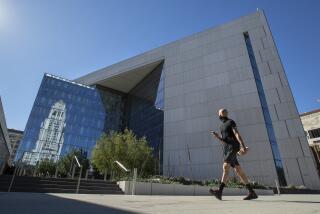LAFD halts popular Twitter feed, blocks access to 911 call records
The Los Angeles Fire Department put its social media accounts on âhiatusâ Thursday and announced it was refusing access to 911 audio recordings and database records that document the departmentâs response to life-and-death medical emergencies.
Fire officials said the change in policy was the result of a new interpretation of a 1996 federal healthcare privacy law by city attorneys, who now say it should shield the release of all information related to medical rescues, including the response times that report how long rescuers take to reach Angelenos requesting help.
âWeâve been told by powers that be that if we provide that information we are in violation of federal law,â said Battalion Chief Stephen Ruda, an LAFD spokesman.
The change is an about-face for the city department, which had routinely published details of responses to 911 calls via an array of social media, including a Twitter account that has more than 34,000 followers.
It also marks a major reduction in the information the department will release in response to requests for information by the media and the public under the California Public Records Act. In the past, the LAFD would release 911 audio recordings as well as data detailing how quickly rescuers arrived at the scene, redacting only limited information such as the names of victims and callers.
Last year, after former Fire Chief Brian Cummings admitted that fire officials had misstated statistics measuring how quickly firefighters respond to 911 calls, The Times requested a copy of the internal department database that logs when and where firefighters were deployed in the hundreds ofcalls the department answers each day.
Following that request, LAFD officials temporarily rolled back access to the records -- only to reverse course after scathing criticism from the office of former Mayor Antonio Villaraigosa.
As the result of an independent analysis of the data, The Times reported delays in processing 911 calls and summoning the nearest medical rescuers from other jurisdictions, as well as wide gaps in response times in different parts of the city. Findings were later confirmed in a report by city auditors and an independent task force charged with fixing the departmentâs data.
The LAFDâs new policy is at odds with many of its fire and law enforcement peers, including the Los Angeles County Fire Department, which routinely releases 911 recordings and response time records.
In the future all requests for such information related to medical responses at the LAFD will be denied under the cityâs new legal policy, which Ruda said was now official.
âThe hiatus is not a hiatus. We are not taking a vacation,â he said.
ALSO:
MAP: How fast is LAFD where you live?
Life on the line: 911 breakdowns at LAFD
LAFD audit criticizes investigations of top officials
Twitter: @palewire
More to Read
Sign up for Essential California
The most important California stories and recommendations in your inbox every morning.
You may occasionally receive promotional content from the Los Angeles Times.











